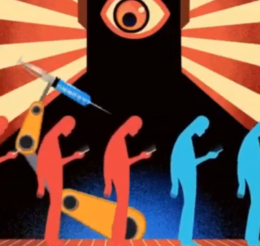Maintain Your Brain

Generations ago it wasn’t uncommon for educated people to memorize chunks of The Iliad, building up their minds by forcing them to do all the rewarding work associated with real reading: assembling images, keeping track of plot and character structure, juggling themes and challenging ideas even as you carried the story along. Then came mass media. Newspapers shortened attention span, movies arrived and did visual assembly for you, TV mastered mental junk food, MTV replaced story with montages of interesting nonsensical images, then finally the Internet came and made it possible to endlessly follow your own random impulses instead of anyone else’s schedule or plot.
I’m not a believer in “eat your vegetables” media. People who want to reform the press often feel the solution involves convincing people that just should read 6,000-word ProPublica investigations about farm prices instead of visiting porn sites or watching awesome YouTube compilations of crane crashes. It can’t work. The only way is to compete with spirit: make articles interesting or funny enough that audiences will swallow the “important” parts, although even that’s the wrong motive. Rolling Stone taught me that the lad-mag geniuses that company brought in in the nineties, who were convinced Americans wouldn’t read anything longer than 400 words in big type, were wrong. In fact, if you treat people like grownups, they tend to like a challenge, especially if the writer conveys his or her own excitement at discovery. The world is a great and hilarious mystery and if you don’t have confidence you can make the story of it fun, you shouldn’t be in media. But there is one problem.
Inventions like TikTok, which I’m on record saying shouldn’t be banned, are designed to create mentally helpless users, like H addicts. If you stand there scrolling and thinking Next! enough, your head will sooner or later be fully hollowed out. You’ll lose the ability to remember, focus, and decide for yourself. There’s a political benefit in this for leaders, but more importantly there’s a huge commercial boon. The mental jellyfish is more susceptible to advertising (which of course allows firms to charge more) and wll show less and less will over time to walk out of the Internet’s various brain-eating chambers.
A cross of Jimmy Page and Akira Kurosawa probably couldn’t invent long-form content to lure away the boobs-and-cat-video addicts these sites are making. The loss of capacity for memory or real experience is what makes people susceptible to the work of cartoon pseudo-intellectuals like Yuval Noah Harari, who seem really to think nothing good or interesting happened until last week. The profound negativity of these WEF-style technocrats about all human experience until now reminds me of Ray Bradbury’s Fahrenheit 451, whose dystopian characters feared books because “They show the pores of the face of life.”
We’re entering a stage of history where, like the underground resistance in Bradbury’s book, we’ll have to build some consciousness as a movement to save the human mind. Because thinking for oneself has already been denounced as a forbidden or transgressive activity in so many different places (from campuses to newsrooms and beyond), it’s probably already true that membership in certain heterodox online communities is enough to put a person on lists of undesirables. And look, I’m not going to lie, Substack is probably one of those places. But whether it’s here or in some more extreme retreat in the future (I keep thinking of Russian WWII movies in which partisans were forced to live in forest hideouts in Belarus), we’ll eventually want to get to know each other a little more, be a little more interactive. I’ve noticed this site is building readerships for fiction and other complex media products, so hopefully this is more of a haven from the brain-eating virus than its opposite. Who knows, but I hope.
I’m adding a couple of unobtrusive new features to Racket. “Nailed it” is a reader comment of the week, complete with a quote and a little information about that person. You don’t have to look at it if you don’t want: it’ll just live on the site on the Racket face page if you feel like clicking. We’re also doing Q&As with other Substack writers, and unlike the last time we tried this, this won’t depend on my overworked self doing the interviews; site manager Emily Bivens is doing the heavy lifting. This week we’ve got author Matthew Crawford. A couple of other small things are coming.
Read it, don’t, no worries, but it’s been a while since this site’s initial mission statement, and I just wanted to put these thoughts down and offer one small update to the original concept: I think this is about a little bit more than independent journalism now. We need to be worried about saving brain cells, period. Ideas are welcome, and thanks for hanging in.



